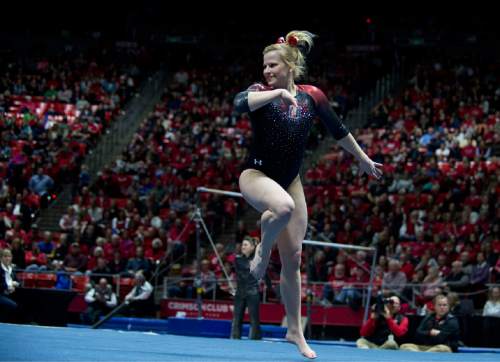This is an archived article that was published on sltrib.com in 2015, and information in the article may be outdated. It is provided only for personal research purposes and may not be reprinted.
A sure sign that the gymnastics season is nearing its critical stages came Monday when the rankings switched from straight averages to the regional qualifying score — a formula in which six scores are taken, with three being road meets, and averaged together after the high score is eliminated.
If it sounds like a complicated formula, just know this: not much has changed for the Utes, other than perhaps a little extra motivation to get their routines as close to perfect as they can.
The Utes, who earned their fourth-highest score in school history with Saturday's 198.05-195.9 win over Stanford, remained in fourth place.
However, now that the RQS is in place, the Utes have a better idea of what separates them from the rest of the top teams. The answer? Not much. Less than seven-tenths of a point separates top-ranked Oklahoma (197.64) from LSU (197.335), Florida (197.27), Utah (197.265) and Alabama (197.055).
Michigan, which visits the Huntsman Center on March 6, is just behind with a 196.985 average.
Utah coach Greg Marsden was happy to see his team among the elite, but said with three meets remaining in the regular season it is still too early to read too much into the rankings.
"You can still get one big score that can change things dramatically," he said. "What everyone wants to do now is look at possible pairings and see where you might go for regionals, but it's still too early to look at that."
The April 4 regional sites are California, Oklahoma, Auburn, West Virginia, Iowa State and Ohio State. Obviously the Utes would like to go to California, since it would be a relatively easy trip, but Marsden said his team needed to worry more about continuing to improve than where it might land for the NCAA Regionals.
The Utes rank first on the vault (49.48), third on the uneven bars (49.335), fifth on the balance beam (49.175) and fifth on the floor (49.335).
"I don't know if we can do any better than we did on the vault and bars the other night," Marsden said. "But we can still be cleaner with the some of our beam routines and the landings on floor can be better. Those are the things we need to focus on."
Individually speaking
Tory Wilson is ranked sixth in the all-around (39.435) and tied with Kailah Delaney for 10th (9.905) on the vault. Georgia Dabritz is first on the vault (9.943) and uneven bars (9.94) and fifth on the floor (9.92). Kassandra Lopez is ninth on the bars (9.88) and Kari Lee is ninth on the balance beam (9.865)
On a streak
Dabritz has won six of the seven uneven bars competitions this season, with the lone miss coming in the third meet of the season when UCLA's Samantha Peszek and Peng-Peng Lee tied for first on the event with Utah's Corrie Lathrop with 9.9s while Dabritz was fourth with a 9.875.
The last Utah gymnast to have such a streak was Wilson, who won all 10 of her regular season vault competitions in 2013.
The Top 25
1. Oklahoma 197.64
2. LSU 197.335
3. Florida 197.27
4. Utah 197.265
5. Alabama 197.055
6. Michigan 196.985
7. Auburn 196.61
8. Nebraska 196.595
9. Georgia 196.525
10. UCLA 196.315
11. Stanford 196.175
12. Oregon St. 196.15
13. Penn St. 196.125
14. Minnesota 196.01
15. Boise St. 196.0
16. Illinois 195.945
17. Arkansas 195.82
18. Denver 195.8
19. California 195.66
20. Arizona 195.615
21. SUU 195.555
22. Wash. 195.395
23. Missouri 195.315
24. Iowa 195.28
25. Kentucky 195.275



